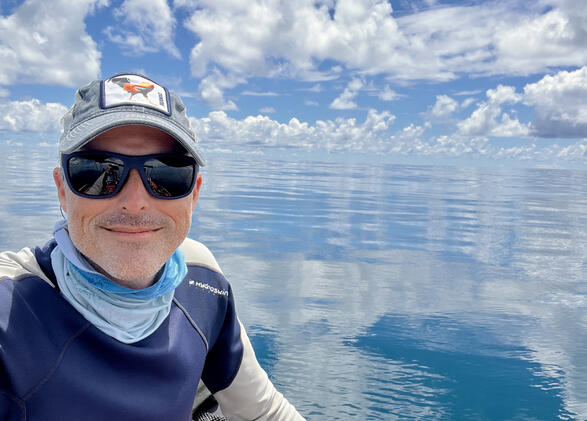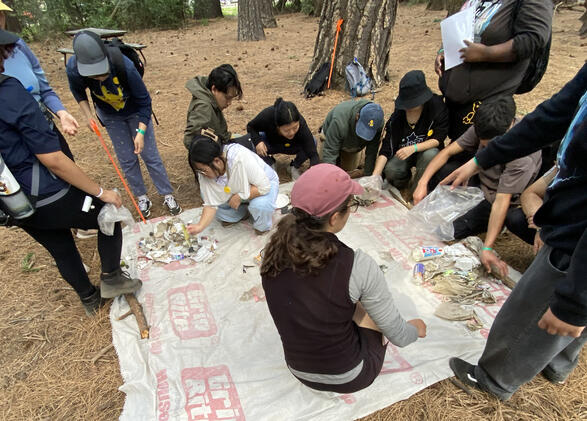Prince William Forest: A Small-Scale Wonder
“TThere’s kind of a quintessential experience in our field of the student who arrives on campus and doesn't want to sit on the grass. And then by the time they're leaving, they're rolling around in the middle of the forest because they've had a chance to get comfortable, explore and be awed by what they're seeing.”
NatureBridge’s Mid-Atlantic Campus Director Kim Hanson has witnessed that transformation time and time again. She began as an educator for NatureBridge in Olympic National Park in 2002 before coming to Prince William Forest Park in 2011, months before programs started. She helped build those programs, forging partnerships with school districts, doing site visits at the park and going into schools alongside Vanessa Morel to talk about the powerful benefits of NatureBridge experiences.
Having been an educator at Olympic, Kim has experienced the unique ways in which programs run in Prince William Forest Park versus other campuses.
“At Mid-Atlantic, we’re sort of in startup mode,” she says. “We're in this cycle of moving into campus, running a two-month season, moving out of campus and then doing it all over again. So we're always in that ‘setting up’ or ‘taking down’ mode.”
The cabin camps in Prince William Forest aren’t winterized, which is why the move-in, move-out cycle exists. Because of this cycle and its relatively new incorporation, the Mid-Atlantic campus requires staff to remain flexible and agile (like a startup company), which has its advantages.
“We use the winter break each year to tweak and re-envision the two and a half day program experiences,” says Kim. “And since we have a smaller staff, there are a lot of hybrid roles. There are probably moments when we’d love more staff, but we’re actually incredibly well-resourced in some ways when you look at the number of kids coming through and length of season.”
That smaller staff is also able to diagnose growth areas and enact change quickly. Bolstered by structural flexibility and minimal institutional inertia, the Mid-Atlantic campus team consistently tests out new ideas.
“One example is when we're thinking about our approach to setting students up for success in our programs; seeing it through an equity lens...we were really able to take a deep dive into restorative practices and restorative communication,” says Kim. “We did some focused professional development for our staff and that has influenced some conversations we've had organizationally about what group management means and what behavior management means.”
What does “startup mode” look like to the kids excitedly bussing out Prince William Forest Park for a three-day NatureBridge experience? Seamless. And magical.
“I think for a lot of them, it's a fantastical adventure, yes,” Kim laughs.
The morning after the students arrive by bus from Prince William County, Stafford County or nearby Washington D.C., it is brisk. Programs may happen during warmer months, but the non-winterized cluster of camp cabins can get chilly overnight. Kids wrap themselves in the thick, wool blankets provided for extra insulation and make their way to the nearby bathhouse before breakfast.
Students then find their way to the dining hall, opening the doors to a spacious yet cozy room with a fireplace at one end. Classmates draped in wool blankets huddle around the fire until their communal meal, after which they go back to their cabins and prepare to meet their NatureBridge educator at 9 a.m. to start the day’s programs.
They begin their day with a stewardship activity — taking out the trash, cleaning up the dining hall, etc. — before exploring the 16,000-acre forest. By midday in the summers, blankets are a distant memory, as kids — some of whom have never stepped foot in a creek before — are splashing in babbling brooks to stay cool in the heat.
“There’s just a profusion of little things,” says Kim. “The park is full of small-scale wonders and quiet peaceful places to sit by the creek or under the canopy of the forest.”
Over the next day and a half, students will discover fungi, spot tadpoles and go through that quintessential transformation Kim mentioned.
“On day one, kids are arriving and having lunch and sitting in little clusters of friends. By the end, they're in these huge clusters because they've connected in different ways with different peers,” says Kim. “They're bringing someone new into their group who brings another person into their group and the clusters grow and grow as they build relationships with each other.”
“Those are some of my favorite memories from Prince William Forest — seeing kids form those connections over just a few days.”
On day one, kids are arriving and having lunch and sitting in little clusters of friends. By the end, they're in these huge clusters because they've connected in different ways with different peers. They're bringing someone new into their group who brings another person into their group and the clusters grow and grow as they build relationships with each other.Kim Hanson, Mid-Atlantic Campus Director
Since March 2020, the Covid-19 pandemic has shut down the increasingly popular programs. The campus pivoted to distance learning and “school yard” programs with excellent results. The school yard programs brought educators onto school campuses for instruction, incorporating the all-important environmental science education aspects of NatureBridge’s programs, but they were logistically incapable of creating the same sense of wonder that happens when you visit a national park. Teachers and students have been clamoring for in-person programs to return as soon as it is safe to do so.
“We get calls from teachers,” says Kim. “We know that teachers have identified a need for the experiences that they know their students have in our programs, and they want their students to have those experiences again.”
Thankfully, programs are slated to return in spring 2022, barring any health and safety concerns or setbacks. When they do return, Kim and the rest of NatureBridge are adamant that they remain focused on equity.
“The majority of our students have been highly scholarshipped,” she says. “We're able to really focus on serving a wide variety of schools and students that wouldn't otherwise be able to attend a program like this in a region where overnight educational programs are a rarity.”
The organization is committed to providing scholarships to any school that wants to participate in its programs despite grant funding for in-person programs disappearing for many organizations since the start of the pandemic.
“As we think about the next 10 years and beyond, we really want to maintain that identity as a NatureBridge campus able to serve any school that wants their students to attend.”
Nine thousand students served and counting.






